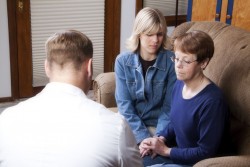Where Can I Seek Support for My Recovery?
The National Institute on Drug Abuse reports there is an increase in illicit drug use in the US. They estimate 24.6 million Americans aged 12 or older—9.4 percent of the population—used an illicit drug in the past month.
You may be one of these people. As you know, seeking rehabilitation for drug and alcohol use is a difficult process and it is one that is impossible to complete in isolation.
Throughout the rehab process, you will look to various people for support that will boost your morale and strengthen your resolve to recover from addiction. And, your need for support won’t end when rehab does.
During the process, you will cultivate relationships that you will rely upon as your recovery unfolds outside of treatment. But, you may not be certain about where to look for support. Don’t worry. The people you can come to rely upon are pretty easy to find, once you start looking.
If you are looking for some immediate support, SubstanceAbuse.org can help. Give us a call to have your questions answered and to be connected with resources and rehabilitation centers. Our number is 800-487-1890 (Who Answers?) , and you can call 24 hours a day.
Family

Your family can show support by joining you in family therapy sessions.
Firstly, it should be acknowledged that many people who develop drug and alcohol dependency or addiction don’t have traditional families upon which to rely. In fact, it is often familial dysfunction the leads people to drugs and alcohol.
In many other situations, substance use disorders are passed from parent to child. In these instances, and ones like them, you don’t need to force a connection where it may ultimately be unhealthy for you and your recovery.
Although, keep in mind that treatment often includes family therapy and you can end up making progress with a family that seemed beyond saving. You never know.
Also, don’t define family as simply the people with which you share DNA. Embrace the concept of an “intentional family”: a group of people you have chosen to bond with like family. This family may include a co-worker, a best friend, a classmate, and people you have known since childhood. When you think of family this way, you discover that you have a greater familial support system than you first recognized.
When you look to your family for support, let them know what you need. They won’t be able to guess or anticipate your needs, especially as you change during recovery. You need to work on rebuilding trust and that starts with communications. Be vocal about your needs and you will get the help you need. There are people in your life who want to support your recovery.
Support Groups
Clearly, support groups can offer support; it’s pretty clearly stated in the title. But, how do you connect with them and take advantage of that support?
Start at your treatment program. It’s possible that former patients meet up or that they have connection with local groups they can refer you to. You may end up in groups with peers that you already feel bonded to.
Next, expand your search. Call churches, hospitals, and community centers. Ask people you went to rehab with. Check online.
When you have a list of possibilities, sample them all. The National Institute on Drug Abuse points out that no particular treatment is correct for everyone. That is true of groups as well.
Online Support Groups
Sometimes, meeting new people can cause anxiety and when you are in recovery anxiety can be an even bigger stressor. This may impact how helpful in-person support groups can be. Although, you should challenge yourself to seek out peers in real life, beginning with an online support group may be easier.
If you still feel anxiety, it’s OK to lurk for a b it and simply read what others have to say. Over time, you will feel connected to the stories of certain users and impacted by the advice given. This will allow you to more fully engage in the community.
The support that you need will be as unique as you and your addiction journey have been. You will know what is right for you. But, it is important that you have a support system, so don’t isolate yourself. For help making it through treatment and transitioning into recovery, call 800-487-1890 (Who Answers?) we can help with your treatment-related needs.